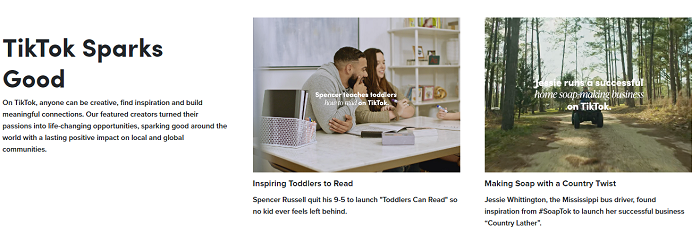With the threat of a US ban looming, TikTok is looking to underline its value to the US economy, via a new initiative through which the platform will highlight how SMBs are using the app to connect with their customers, and the community, to build their business.

The new ‘TikTok Sparks Good’ docu-series will share a range of short stories ‘that celebrate the diverse and inspirational creator success that transcend beyond TikTok to create real life change’.
Which, ostensibly, celebrates these creators and the successes that they’re seeing in the app. But it’s also a fairly transparent vehicle through which to potentially sway to US regulators who may be considering whether to ban the app.
And TikTok’s laying it on pretty thick:
“TikTok is a place where Americans can transform not only their own lives, but the lives of others. From first generation children saving their parent’s small businesses to creators rallying the community to support our veterans, TikTok is where anyone can build community, connect, educate, and create economic opportunity. We are amazed by the power of the TikTok community and how it makes the platform a catalyst for good.”
I mean, that’s not not true, but at the same time, TikTok has also been the source of a range of harmful trends, negative psychological impacts for teens, exploitation, misinformation, etc.
Whether the platform is a net positive or negative is not entirely clear – while that question within itself isn’t part of the assessment as to whether TikTok should be allowed to continue operating in the US either way.
That comes down to the app’s links to China, and the provisions with China’s cybersecurity laws which stipulate that Chinese-owned businesses must share user data with the CCP on request.
There’s nothing to suggest that the CCP has requested such as yet, nor that TikTok has provided it. But the concern is that TikTok could be used as a tool for spying on US citizens, by using TikTok data to track their movements, or glean personal information about users in order to use that as leverage.
For the most part, that may seem like a lesser concern – why would the Chinese Government want to target people based on their hokey TikTok clips?
But it can be a problem.
Late last year, it was revealed that representatives from TikTok’s parent company ByteDance had used TikTok data to track the movements of US journalists, in a bid to discover which ByteDance employees may be leaking info to the press.
As reported by The Financial Times:
“Over the summer, four employees on the ByteDance internal audit team looked into the sharing of internal information to journalists. Two members of staff in the US and two in China gained access to the IP addresses and other personal data of FT journalist Cristina Criddle, to work out if she was in the proximity of any ByteDance employees, the company said.”
This is the key concern around the misuse of TikTok data, and in this context, the growing bans of the app on government-owned devices makes sense, as that could be used as a vector to track people’s movements, and monitor who they’re meeting with.
For government employees, who may be in possession of sensitive information, there’s a clear risk here. So while it may not seem like a major concern to the everyday TikTok user who’s posting random jokes and dance clips, there is a more sinister element, which could be of concern, especially amid rising tensions between China and various other nations.
So while TikTok is doing all that it can to highlight its value, it’s actually more of an aside, and not really relevant to the focus of the broader ban discussions.
But that does seem like the focus here. And while it is interesting to note the various ways in which TikTok has helped these SMBs, it seems fairly clear what the intention is in this respect.
Either way, you can tune into the new ‘TikTok Sparks Good’ stories here, which could inspire you to support these businesses, or give you new ideas for your own TikTok promotion efforts.



